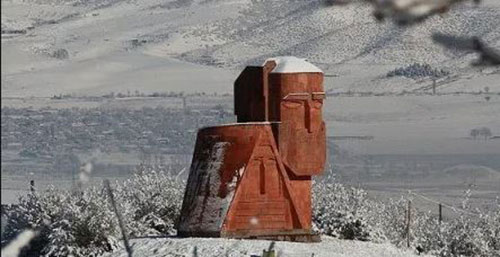For 100 days now, Azerbaijan has been subjecting Artsakh to an illegal blockade, the ultimate goal of which is to destroy the Artsakh people as such by expelling them from their historical homeland. Accompanying their actions with the use of force and acts of terror, Azerbaijan is pursuing a consistent policy aimed at forcibly suppressing the right of the people of Artsakh to self-determination. At the same time, the Azerbaijani authorities openly demonstrate their rejection of negotiations as a means of finding a solution to any issue.
It should be noted that for several decades, Azerbaijan has been striving to get rid of the people of Artsakh and resolve the Azerbaijan-Karabakh conflict by force. The first victims of such a criminal policy were, in particular, the Armenians who lived in Azerbaijan during the Soviet period. The deportation of Armenians from Azerbaijan organized by the local authorities in 1988-1990 and accompanied by massacres, torture and pogroms, marked the beginning of a new stage in Azerbaijan’s policy of persecuting Armenians. As early as in 1991, the Azerbaijani authorities continued the deportation of Armenians from Artsakh, which, in various forms and manifestations, has continued to this day.
Subsequently, in violation of international law and the UN Charter, and in an attempt to get rid of the people of Artsakh and suppress their right to freedom and self-determination, Azerbaijan has resorted to force three times to resolve the conflict through direct military aggression against Artsakh. All three wars waged by Azerbaijan against Artsakh were accompanied by massive human rights violations and war crimes, including wilful killings of civilians, extrajudicial executions and torture of prisoners of war and civilian hostages, indiscriminate shelling, the use of internationally prohibited ammunition, and deliberate attacks on critical civilian infrastructure.
As a result of the aggression against Artsakh in 2020 and the occupation of a vast part of its territory, more than 40 thousand Armenians of Artsakh became forcibly displaced. All civilians who remained in the territories that came under the control of Azerbaijan were brutally killed by Azerbaijani soldiers. Azerbaijan’s provocations and attacks on the civilians of Artsakh, including wilful killings, continued even after the signing of the trilateral ceasefire statement of 9 November 2020.
Read also
Widespread and systematic violations of the rights of the people of Artsakh by Azerbaijan, including massacres, deportations, torture and other inhuman acts, are not only encouraged, but also co-ordinated at the state level. The Azerbaijani authorities do not even hide their criminal intentions to carry out ethnic cleansing and genocide in Artsakh. This is evidenced by the numerous public statements made by the President of Azerbaijan. The latest such statement was made on 18 March 2023, during his defiantly provocative visit to the Armenian village of Talish occupied during the 44-day aggression, the entire population of which was forcibly displaced. The visit itself, as well as the aggressive and belligerent statements of the Azerbaijani senior leadership during that visit, indicate that official Baku plans to extend the scenario implemented in the occupied village of Talish to the whole of Artsakh.
Along with this, throughout the entire negotiation process since the 1990s, Azerbaijan has sabotaged all efforts of the international mediators, in particular, the OSCE Minsk Group co-chairing countries, aimed at a peaceful settlement of the Azerbaijan-Karabakh conflict based on international law, each time refusing at the last moment from agreements on a compromise solution. Moreover, after the war of aggression in 2020, the Azerbaijani authorities refused altogether from the peace negotiations, declaring the issues of the life and rights of the people of Artsakh as their internal matter.
Azerbaijan’s deliberate policy of ethnic cleansing against the people of Artsakh indicates the need for the international community to reconsider their approaches to the issue of the status of Artsakh and the political settlement of the Azerbaijan-Karabakh conflict. The scale and gravity of the crimes committed by Azerbaijan at the state level against the people of Artsakh, as well as the ongoing genocidal policy, require decisive and urgent action by the international community, including the bodies responsible for maintaining international peace and security.
We believe that, at this stage, the development of additional legally binding obligations to resolve the conflict by peaceful means, the consolidation of the principles of non-use or threat of force and equal rights and self-determination of peoples as the basis for negotiations, as well as the restoration of the international mechanism for direct negotiations between Artsakh and Azerbaijan meet the requirements international law and the universal commitment to the protection of human rights around the world. Universal recognition of the Artsakh people’s inalienable right to self-determination is the most effective way in which the international community can guarantee the protection of human rights and fundamental freedoms in Artsakh.
We recall that according to international law and international practice, the denial and forceful suppression of the right to self-determination, accompanied by massive human rights violations, as well as the rejection of negotiations as a means of resolving conflict, are sufficient grounds for recognising the right of a people to establish an independent state.
Ministry of Foreign Affairs of the Republic of Artsakh

























































